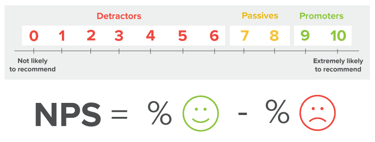 Never underestimate the power of word of mouth. It can make or break a hotel, and often holds more weight than traditional advertising practices.
Never underestimate the power of word of mouth. It can make or break a hotel, and often holds more weight than traditional advertising practices.
Of course it’s then in the best interest of every hotel manager and owner to help guests depart their establishments with smiles on their faces, and a good review poised on the tips of their tongues.
But how can you, as that manager or owner, best gauge how guests feel once they've packed their bags and left? And how can you effectively use that information to improve your business? Enter the Net Promoter Score (NPS) ...
The NPS is a management tool and customer loyalty metric that operates on a simple scoring system, asking that all-important question, “Would you recommend us?”
Guests provide an answer from 0 to 10, with 9 to 10 classing them as ‘promoters’ (highly likely to recommend your hotel), 0 to 6 as ‘detractors’ (very unlikely to recommend), and 7 to 8 as ‘passives’
 Your total Net Promoter Score is then calculated by subtracting the percentage of detractors from the percentage of promoters, which generates a number between -100 and 100. Generally, any number in positive territory (higher than zero) is seen to be good, with 50 and above considered excellent.
Your total Net Promoter Score is then calculated by subtracting the percentage of detractors from the percentage of promoters, which generates a number between -100 and 100. Generally, any number in positive territory (higher than zero) is seen to be good, with 50 and above considered excellent.
Why use NPS?
Knowing your hotel’s Net Promoter Score puts the ball in your court to either make the necessary changes to improve your standard of service, or build on your current practices to ensure guests keep coming back.
There are a number of benefits that arise through analysing and improving your NPS, such as:
- Improved profit margins – promoters aren’t as price-sensitive as other guests, as they see great value in the services your hotel provides. Detractors tend to think they’re getting a raw deal. What cost-effective measures can you introduce to add value to your existing service?
- A higher guest retention rate – detractors tend to defect at much higher rates than promoters, which means a shorter, less profitable relationship with your hotel. Does your staff need interpersonal training? Are there little touches you can add, like chocolates on a pillow or fresh flowers in a room, that will enhance your guest's experience? Focus on ways to turn detractors into promoters in order to retain guest loyalty and boost profits.
- Greater cost efficiencies – promoters stay for longer periods and help generate solid referrals, thereby reducing customer acquisition costs. Detractors have more complaints and tend to consume more service resources.
- Higher annual spend – promoters spend more, more often, than detractors and group their spending with one trusted supplier – you. As far as possible, your hotel should be a one-stop-shop for guests. Why give them a reason to go elsewhere when you could introduce new offerings?
- Greater word of mouth – it goes without saying that promoters can contribute a great deal of new business, while detractors can drag your name through the mud. Give guests something great to talk about, make their stay with you memorable, and you’ll have a promoter to sing your praises to the masses. It’s usually a lifetime value.
And that’s NPS in a nutshell. Pay attention to how you can improve the number of promoters your hotel has, and you’ll quickly see improved returns.




